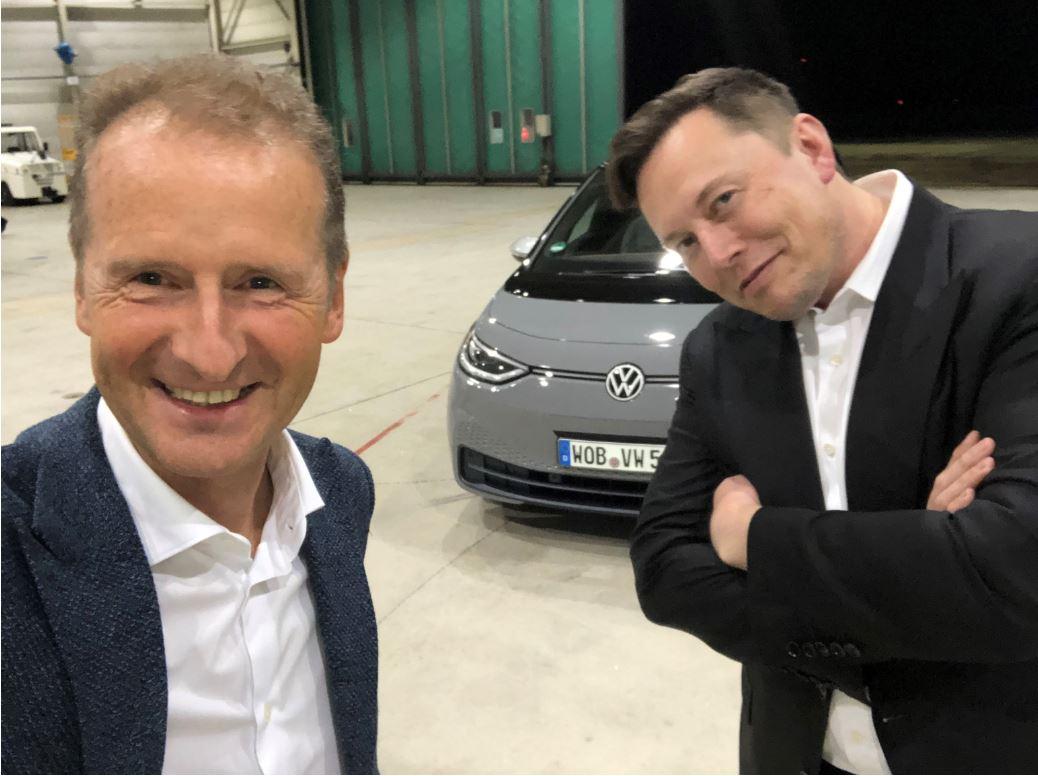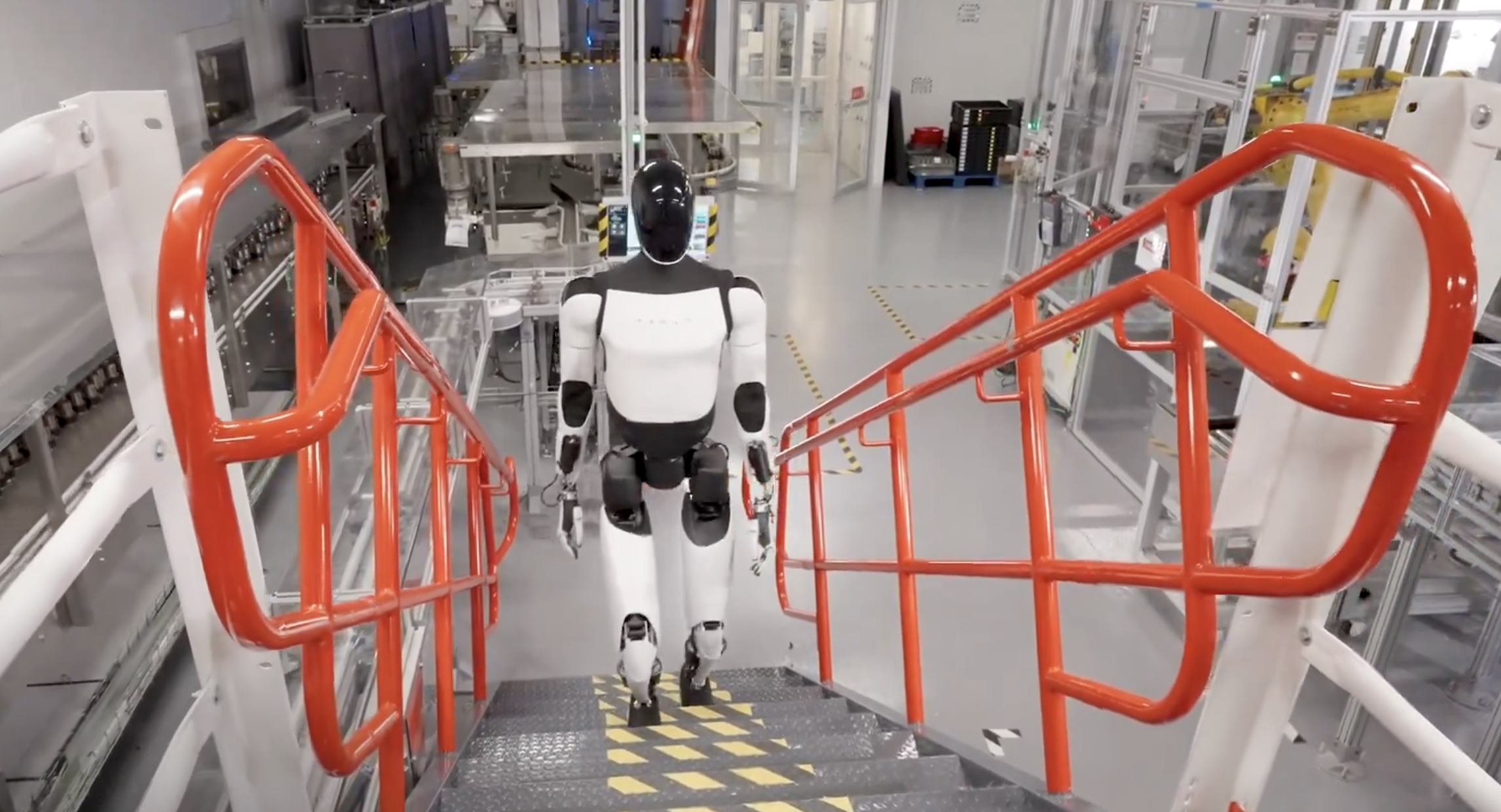

Investor's Corner
Tesla’s rumored sale of regulatory credits to VW to last ‘two to three years’
Tesla’s rumored sale of its regulatory credits to Volkswagen to help the German automaker reach emissions targets is likely to last “two to three years,” according to VW Auto Group CEO Herbert Diess.
The sale of credits will help Volkswagen align with regional emissions targets that could affect the company’s ability to conduct business in China and the United States. The emissions targets are different in every country, some with more strict regulations than others. China has some of the toughest emissions regulations globally due to the massive number of passenger vehicles that operate in the country. Due to this fact, some automakers, like Volkswagen, must purchase regulatory credits from other automakers to meet the emissions targets. It helps the purchasing automaker avoid hefty fines, while it can help the selling automaker solidify financial safety and fund projects.
Tesla doesn’t have an issue reaching these targets due to its environmentally-friendly electric powertrains. For over a year, Tesla has been selling regulatory credits to other automakers, a deal that has helped Tesla fund some of its international projects. One of the most notable deals is Tesla’s sale of credits to Fiat-Chrysler Automobiles, requiring FCA to pay Tesla $2 billion through 2023. The sale was to help FCA reach the European Union’s CO2 requirement of 95g per kilometer in 2020. This deal recently ended after Stellantis CEO Carlos Tavares stated that the company would no longer need to purchase the credits from Tesla. This was due to the merger between Peugeot S.A. (Groupe PSA) and FCA in January 2021, which ultimately birthed Stellantis. Stellantis now controls 14 traditional automotive brands, including Fiat, Chrysler, Jeep, Maserati, and Peugeot.
However, Tesla isn’t losing all of its deals for its regulatory credits. It appears Volkswagen will still purchase credits from Tesla. Although it hasn’t been officially confirmed who VW will get its credits from, recent reports indicate that Tesla will be the seller. Recent comments from Herbert Diess, CEO of the Volkswagen Auto Group, on the company’s Earnings Call earlier today seem to indicate that the company will continue for several years.
?@VWGroup ‘s Diess confirms they are paying regulatory credits in China and US (likely to @tesla) and says they will continue to for the next “two to three years”, phasing out as the EV roll-out ramps up.
Chinese Q1 BEV volumes just 6,244 units compared to 42,421 in Europe. pic.twitter.com/KrCdgjOafy
— Matthias Schmidt (@auto_schmidt) May 6, 2021
“In Europe, we are confident that we will comply with the fleet targets,” Diess said during the Earnings Call. However, the case is different in China and the United States, and Diess says that the automaker will need to rely on credits to avoid the fines for “the next two or three years.” With VW’s expanding EV strategy, it appears that the German company will no longer need to purchase these credits by 2024 at the latest.
In China, VW will likely be purchasing the credits from Tesla. After a report from Reuters in April indicated that VW’s joint venture with state-owned Chinese carmaker FAW, called FAW-Volkswagen, would be purchasing credits from Tesla to meet the environmental standards set by the Chinese government. Three individuals close to the matter informed Reuters of the deal.
Concerns regarding Tesla’s financials and its ability to remain profitable without the excessive sale of EV credits continue to rage on. However, Tesla has shown that it generates revenue through several mediums, including automotive sales, car leases, and other investments, including the automaker’s Bitcoin purchase in late 2020. The $1.5 billion Bitcoin purchase was a way for not immediately used cash could generate “some level of return…but also preserve liquidity,” Tesla CFO Zachary Kirkhorn said during the company’s most recent Earnings Call.
Ultimately, it isn’t known who Volkswagen will purchase the credits from globally. However, if recent reports are correct, Tesla will be sending its credits to VW in return for hefty $56 per green credit prices.
Investor's Corner
Tesla could save $2.5B by replacing 10% of staff with Optimus: Morgan Stanley
Jonas assigned each robot a net present value (NPV) of $200,000.

Tesla’s (NASDAQ:TSLA) near-term outlook may be clouded by political controversies and regulatory headwinds, but Morgan Stanley analyst Adam Jonas sees a glimmer of opportunity for the electric vehicle maker.
In a new note, the Morgan Stanley analyst estimated that Tesla could save $2.5 billion by replacing just 10% of its workforce with its Optimus robots, assigning each robot a net present value (NPV) of $200,000.
Morgan Stanley highlights Optimus’ savings potential
Jonas highlighted the potential savings on Tesla’s workforce of 125,665 employees in his note, suggesting that the utilization of Optimus robots could significantly reduce labor costs. The analyst’s note arrived shortly after Tesla reported Q2 2025 deliveries of 384,122 vehicles, which came close to Morgan Stanley’s estimate and slightly under the consensus of 385,086.
“Tesla has 125,665 employees worldwide (year-end 2024). On our calculations, a 10% substitution to humanoid at approximately ($200k NPV/humanoid) could be worth approximately $2.5bn,” Jonas wrote, as noted by Street Insider.
Jonas also issued some caution on Tesla Energy, whose battery storage deployments were flat year over year at 9.6 GWh. Morgan Stanley had expected Tesla Energy to post battery storage deployments of 14 GWh in the second quarter.
Musk’s political ambitions
The backdrop to Jonas’ note included Elon Musk’s involvement in U.S. politics. The Tesla CEO recently floated the idea of launching a new political party, following a poll on X that showed support for the idea. Though a widely circulated FEC filing was labeled false by Musk, the CEO does seem intent on establishing a third political party in the United States.
Jonas cautioned that Musk’s political efforts could divert attention and resources from Tesla’s core operations, adding near-term pressure on TSLA stock. “We believe investors should be prepared for further devotion of resources (financial, time/attention) in the direction of Mr. Musk’s political priorities which may add further near-term pressure to TSLA shares,” Jonas stated.
Investor's Corner
Two Tesla bulls share differing insights on Elon Musk, the Board, and politics
Two noted Tesla bulls have shared differing views on the recent activities of CEO Elon Musk and the company’s leadership.

Two noted Tesla (NASDAQ:TSLA) bulls have shared differing views on the recent activities of CEO Elon Musk and the company’s leadership.
While Wedbush analyst Dan Ives called on Tesla’s board to take concrete steps to ensure Musk remains focused on the EV maker, longtime Tesla supporter Cathie Wood of Ark Invest reaffirmed her confidence in the CEO and the company’s leadership.
Ives warns of distraction risk amid crucial growth phase
In a recent note, Ives stated that Tesla is at a critical point in its history, as the company is transitioning from an EV maker towards an entity that is more focused on autonomous driving and robotics. He then noted that the Board of Directors should “act now” and establish formal boundaries around Musk’s political activities, which could be a headwind on TSLA stock.
Ives laid out a three-point plan that he believes could ensure that the electric vehicle maker is led with proper leadership until the end of the decade. First off, the analyst noted that a new “incentive-driven pay package for Musk as CEO that increases his ownership of Tesla up to ~25% voting power” is necessary. He also stated that the Board should establish clear guidelines for how much time Musk must devote to Tesla operations in order to receive his compensation, and a dedicated oversight committee must be formed to monitor the CEO’s political activities.
Ives, however, highlighted that Tesla should move forward with Musk at its helm. “We urge the Board to act now and move the Tesla story forward with Musk as CEO,” he wrote, reiterating its Outperform rating on Tesla stock and $500 per share price target.
Tesla CEO Elon Musk has responded to Ives’ suggestions with a brief comment on X. “Shut up, Dan,” Musk wrote.
Cathie Wood reiterates trust in Musk and Tesla board
Meanwhile, Ark Investment Management founder Cathie Wood expressed little concern over Musk’s latest controversies. In an interview with Bloomberg Television, Wood said, “We do trust the board and the board’s instincts here and we stay out of politics.” She also noted that Ark has navigated Musk-related headlines since it first invested in Tesla.
Wood also pointed to Musk’s recent move to oversee Tesla’s sales operations in the U.S. and Europe as evidence of his renewed focus in the electric vehicle maker. “When he puts his mind on something, he usually gets the job done,” she said. “So I think he’s much less distracted now than he was, let’s say, in the White House 24/7,” she said.
TSLA stock is down roughly 25% year-to-date but has gained about 19% over the past 12 months, as noted in a StocksTwits report.
Investor's Corner
Cantor Fitzgerald maintains Tesla (TSLA) ‘Overweight’ rating amid Q2 2025 deliveries
Cantor Fitzgerald is holding firm on its bullish stance for the electric vehicle maker.

Cantor Fitzgerald is holding firm on its bullish stance for Tesla (NASDAQ: TSLA), reiterating its “Overweight” rating and $355 price target amidst the company’s release of its Q2 2025 vehicle delivery and production report.
Tesla delivered 384,122 vehicles in Q2 2025, falling below last year’s Q2 figure of 443,956 units. Despite softer demand in some countries in Europe and ongoing controversies surrounding CEO Elon Musk, the firm maintained its view that Tesla is a long-term growth story in the EV sector.
Tesla’s Q2 results
Among the 384,122 vehicles that Tesla delivered in the second quarter, 373,728 were Model 3 and Model Y. The remaining 10,394 units were attributed to the Model S, Model X, and Cybertruck. Production was largely flat year-over-year at 410,244 units.
In the energy division, Tesla deployed 9.6 GWh of energy storage in Q2, which was above last year’s 9.4 GWh. Overall, Tesla continues to hold a strong position with $95.7 billion in trailing twelve-month revenue and a 17.7% gross margin, as noted in a report from Investing.com.
Tesla’s stock is still volatile
Tesla’s market cap fell to $941 billion on Monday amid volatility that was likely caused in no small part by CEO Elon Musk’s political posts on X over the weekend. Musk has announced that he is forming the America Party to serve as a third option for voters in the United States, a decision that has earned the ire of U.S. President Donald Trump.
Despite Musk’s controversial nature, some analysts remain bullish on TSLA stock. Apart from Cantor Fitzgerald, Canaccord Genuity also reiterated its “Buy” rating on Tesla shares, with the firm highlighting the company’s positive Q2 vehicle deliveries, which exceeded its expectations by 24,000 units. Cannacord also noted that Tesla remains strong in several markets despite its year-over-year decline in deliveries.
-

 Elon Musk1 day ago
Elon Musk1 day agoWaymo responds to Tesla’s Robotaxi expansion in Austin with bold statement
-

 News1 day ago
News1 day agoTesla exec hints at useful and potentially killer Model Y L feature
-

 Elon Musk2 days ago
Elon Musk2 days agoElon Musk reveals SpaceX’s target for Starship’s 10th launch
-

 Elon Musk3 days ago
Elon Musk3 days agoTesla ups Robotaxi fare price to another comical figure with service area expansion
-

 News1 day ago
News1 day agoTesla’s longer Model Y did not scale back requests for this vehicle type from fans
-

 News1 day ago
News1 day ago“Worthy of respect:” Six-seat Model Y L acknowledged by Tesla China’s biggest rivals
-

 News2 days ago
News2 days agoFirst glimpse of Tesla Model Y with six seats and extended wheelbase
-

 Elon Musk2 days ago
Elon Musk2 days agoElon Musk confirms Tesla is already rolling out a new feature for in-car Grok








